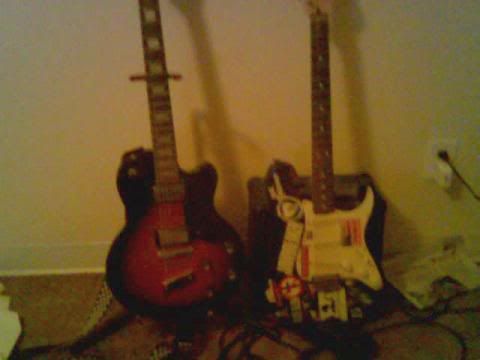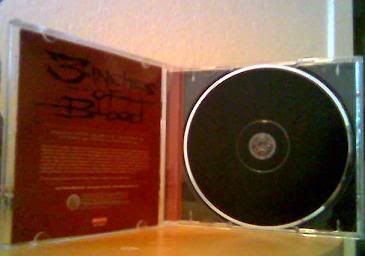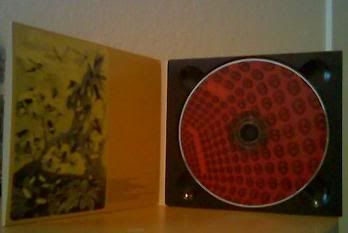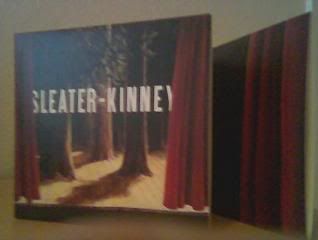Sunday, November 25, 2007
So long, and thanks for all the fish...
If there's any advice I can give to future Cat Scan students, it's to find and stick with something you're interested in and passionate about. As long as you can blog about it all semester, that is. Anyone who knows me knows that I love music and can't live without it. It's gotten me through some rough times in the last 4 1/2 years, and been the soundtrack to the good times, too. So, without further delay, here are the 10 bands/artists who have influenced and amazed me in the time that I've been in college (with links so that, hopefully, you can fall in love with them too):
1. Sleater-Kinney
2. Against Me!
3. Jawbreaker
4. Tegan & Sara
5. Mastodon
6. Bad Religion
7. Lemuria
8. Converge
9. The Clash
10. Hot Water Music
Even though I'd be the first to say that I've gotten a little sick of hearing about green issues and conservation over the past semester, it's only because of all the hard work that myself and my classmates have put into informing people about the different things that we can all do to help the Earth. I may joke around, but I'd be lying if I said that our treatment of the environment isn't one of the most important things facing our world right now. And if there's anything I've learned over the last few months, it's that even the smallest things can make a difference.
Monday, November 19, 2007
Biodiesel tour buses

Photo courtesy of Biodiesel.org
Monday, November 12, 2007
Brushfire Records
One Percent for the Planet links corporations and companies to non-profit environmental organizations to fund conservation projects around the world by encouraging those companies to donate, you guessed it, one percent of their profits. Currently there are more than 700 companies involved in the program giving to more than 1,500 non-profits on six continents. Brushfire Records also provides links to many different environmental causes, including a story about surfers protesting the killing of whales in Japan (Johnson is a surfer himself). With Brushfire and Earthology labels making an effort to go green, and Rick Rubin encouraging Columbia Records to engage in more eco-friendly habits, we could have a full-scale green movement in the record industry on our hands.
Monday, November 5, 2007
Talking the talk
All that being said, why don't more bands and artists just sing about these issues instead? A nice catchy pop song or fist-pumping rock anthem about the planet would certainly be an easier pill for fans to swallow than another sermon given at a press conference. If you look at the kinds of bands that do things like play Live Earth or are the most vocal about conservation, it's hard to find any of them that actually write songs about the problems that they want to address. U2? Nope. Coldplay? Not really.
Sure, you might say that it would sound a little weird for bands to sing about how much they love trees and the outdoors, but if some bands can write appealing and insightful songs about politics, surely they can do the same about the environment. Maybe the key is to do it in unorthodox and creative ways. Take the song "Forest King" by the thrash metal band 3 Inches of Blood. The lyrics are about creatures of the forest that come to life and fight back against men who try to destroy their habitat. Sure, the idea may be a little silly, but can you think of a better way to send an Earth-friendly message to a bunch of surly metalheads? Some artists take a more straight-forward approach, like folk-rock artist Chuck Ragan, formerly of the now-reunited punk rock legends Hot Water Music. His song "It's What You Will" from the album Feast or Famine has the line "Mind the world that's dying, it isn't yours to kill." It's a nice sentiment about being kind to the Earth without beating the listener over the head with slogans and preaching.
So, before rock bands plan their next hyped up benefit concert or pet cause, maybe they should reconsider and figure out a way to get their message out in a more palatable way. After all, they are songwriters first and foremost, so what better way to get the word out?
Monday, October 29, 2007
CD vs. LP: Which is greener?
 As you can see, I have a pretty good size CD collection (somewhere in the ballpark of 200 or so, but I haven't counted recently). After browsing through all of them, I could only find one that had any kind of recycled packaging: Potemkin City Limits by Propagandhi (the booklet is printed on 100% post-consumer, recycled paper). This wasn't too surprising, seeing as the Canadian punk band is very active in animal rights and environmental issues. After doing a little research, I discovered the type of plastic that CD cases are made from, polystyrene, is not recyclable, so all of those CDs, when they're thrown away, will just end up in a landfill somewhere. Whether or not you can recycle the paper booklets that come with the CD is a different story, and depends on the kind of paper that it is printed on.
As you can see, I have a pretty good size CD collection (somewhere in the ballpark of 200 or so, but I haven't counted recently). After browsing through all of them, I could only find one that had any kind of recycled packaging: Potemkin City Limits by Propagandhi (the booklet is printed on 100% post-consumer, recycled paper). This wasn't too surprising, seeing as the Canadian punk band is very active in animal rights and environmental issues. After doing a little research, I discovered the type of plastic that CD cases are made from, polystyrene, is not recyclable, so all of those CDs, when they're thrown away, will just end up in a landfill somewhere. Whether or not you can recycle the paper booklets that come with the CD is a different story, and depends on the kind of paper that it is printed on.But what about other musical mediums? I also own a few vinyl LPs, thanks to my recent purchase of a record player:
 According to The Vinyl Institute, which deals with recycling vinyl products in all forms, anything made of vinyl can be recycled and reused. So, unlike CDs, records don't have to be thrown away. I recently made the decision to start purchasing most of my music in LP form. Not only are more artists (especially those on independent labels) releasing new albums in this tried-and-true format, but the sound quality is in some ways superior to CDs, and thanks to their larger size, LP sleeves often have more artwork and generally give a richer musical experience. Sometimes, they can even be cheaper than CDs. Plus, trying to find rare releases or all of your favorite albums in vinyl format can be a fun challenge for any music collector. So, before you dismiss the vinyl resurgence as just another hipster fad, think about the ways that this versatile format can help the planet.
According to The Vinyl Institute, which deals with recycling vinyl products in all forms, anything made of vinyl can be recycled and reused. So, unlike CDs, records don't have to be thrown away. I recently made the decision to start purchasing most of my music in LP form. Not only are more artists (especially those on independent labels) releasing new albums in this tried-and-true format, but the sound quality is in some ways superior to CDs, and thanks to their larger size, LP sleeves often have more artwork and generally give a richer musical experience. Sometimes, they can even be cheaper than CDs. Plus, trying to find rare releases or all of your favorite albums in vinyl format can be a fun challenge for any music collector. So, before you dismiss the vinyl resurgence as just another hipster fad, think about the ways that this versatile format can help the planet.
Monday, October 22, 2007
Something for the kids
Case in point: the Banana Slug String Band. They're a band made up of teachers and musicians from Santa Cruz, California who play children's music and encourage learning about the environment, nature, and science. They also use interactive demonstrations to get kids interested in learning about the world around them. Think Raffi crossed with Sesame Street. They've released several CDs of music, and have won many children's music awards. You can even schedule them to give workshops and perform at your school. In addition, they support organic farms and other Earth-friendly resources. To check out some of their music, you can listen to a clip of the song "Singing to the Moon," and you can find more clips on their ordering page.
Sure, it may sound kind of silly to us, but anyone who has children or younger siblings will tell you that kids love colorful characters and fun songs and really embrace that kind of learning. Even those of us who are older can maybe take a break from reading all the gloomy warnings about global catastrophe and have fun singing along to a song about a moose.
Monday, October 15, 2007
A follow-up on guitars and the environment
For instance, Martin acoustic guitars made of Rosewood may have cost $600-$800 3o years ago, but now go for an astronomical $10,000-$12,000, well out of the price range of the average guitar player. Also in danger is the Sitka Spruce, which is used in a variety of instruments. The species itself is not endangered, but there are fewer and fewer trees of the right age and size to make good instruments. Manufacturers have turned to cheaper, more available species of wood to use, but at the cost of changing the tone and character of the instrument.
This can be seen as a microcosm of conservation in general. As we use up more and more of the planet's resources, we find that the things that we took for granted are simply not there anymore, and we are forced to find inferior alternatives. Every guitar player and musician deserves to get the finest sound quality available when they play, but that won't be possible unless we take greater care of our resources.
Monday, October 8, 2007
Green record labels
Sub Pop isn't the only label to make a concerted effort to reduce its environmental impact. Earthology Records, founded by the band Cloud Cult, takes this idea to a whole other level. The label is based on an organic farm in Minnesota, powered by geothermal and wind energy, where the band personally recycles and cleans old plastic CD jewel cases and packages the CDs in recycled paper and non-toxic shrink wrap. The band also donates all profits to environmental charities. Not only is this attitude helpful to the environment, but it brings back a certain do-it-yourself ethic to music that is very rare these days. Time will tell if other labels follow the lead of Earthology and Sub Pop, but until then they will continue to set an eco-friendly example.
NOTE: At the time of this blog post, Earthology Records' website had been hacked and was unavailable.
Sunday, September 30, 2007
Eco-friendly guitars

According to the Fender, their Standard Stratocasters are made with an alder body, maple neck, and rosewood fretboards (maple fretboards are also available). Maple and alder are fairly prominent North American trees, but Brazilian Rosewood is listed as an endangered species by the World Conservation Union. Consequently, guitar makers have switched from the Brazilian variety to more common varieties from India and Madagascar.
Some guitar makers are taking it upon themselves to find more environmentally-conscious ways of building fine instruments. Dave Maize makes acoustic guitars and basses from other woods that are rainforest-friendly and come from unorthodox places such as driftwood, as well as discarded woods from construction and even trees damaged by forest fires. According to his website, his instruments are being played by guitarists from such bands as U2 and Pearl Jam. I wish I could try out one of his guitars, but unfortunately they are only sold by order or from his shop in Oregon. However, you can listen to samples of his guitars and basses being played.
With all of the countless things we use wood and lumber for, guitars may seem like an insignificant portion of the total amount of trees being cut down every year, but like most things, it adds up over time. Besides, wouldn't you feel foolish singing a song about saving the environment if part of a rainforest had to be demolished to make your guitar?
NOTE: I attempted to find information about the woods used to make DeArmond guitars, but apparently the company is now defunct. Guess mine is a collector's item!
Monday, September 24, 2007
Death metal is more eco-friendly than you think
Most interestingly, though, they are also supporters of something called the Voluntary Human Extinction Movement (VHMET, pronounced "vehement"). According to their website, VHMET calls for humans to voluntarily stop breeding so that the human race will eventually die out on its own, allowing the Earth to recover and flourish. Their motto? "May we live long and die out." Such a view may seem unbelievable and insane at first, but can it really be anymore crazy than a band called Cattle Decapitation that sings about saving animals?
Monday, September 17, 2007
Throw it all away- Recycling and outdoor concerts
I'm terrible at estimating crowd sizes, but I would guess there was at least 10,000 people in attendance. Since venue rules dictated that each guest could only bring one sealed bottle of water, that means there are are tons of people who will need to buy water, beer, and other beverages throughout the course of the event, which lasted from 1 PM to almost 11 PM. Mercifully, the temperature only got up into the low 90's at the most, so hydration wasn't as big an issue as it could have been, but sweaty mosh-pitters still need something to cool down with after the band finishes playing. It was hard not to notice that the ground was almost completely covered with trash, and you could almost walk across the field without touching the grass.

I managed to grab a spot on the front row for Against Me!'s set (I'm a huge fan, and this was my third time seeing them live), and I immediately noticed that at the foot of the stage was a large mound of trash that had been thrown towards the stage. All the beer bottles sold at the concert were plastic, both to protect the fans from broken bottles and, more importantly, to make them less dangerous projectiles should they be thrown at the stage. All this plastic littering the ground made me wonder if there were any recycling bins around, but after wandering around for a little bit, I couldn't find a single one. Now, I know it's expecting a bit much to think that a crowd of drunken rock fans would think to recycle their beer bottles instead of just throwing them on the ground, but if the option was there, I'm sure some people would take advantage of it. Of course, some people still need those bottles to hurl thoughtlessly at the performers, and there was a constant barrage aimed at the stage. Most took it in stride, though. Tom Gabel, Against Me!'s lead vocalist and guitarist, just grinned and said "Oh please, we've had much worse than this."
It's a sad state of affairs that in this Earth-friendly eco-movement that is going on, we can't even seem to do something as simple as putting recycling bins at a concert that produces tons upon tons of plastic trash. Perhaps Mother Nature had this in mind when she exacted retribution with a 10-minute downpour in the middle of the Smashing Pumpkins' set, which soaked the crowd and the band, and threatened to end the show.
Here's a quick and dirty slide show of some pictures I took at the show. Please excuse the quality, since I only had a disposable camera. Enjoy! Oh, and if you want to hear more about the concert itself, check out my just-for-fun blog, The Liberation Frequency.
Sunday, September 9, 2007
Was Live Earth a failure?
However, there were many questions as to the validity of the event, and whether it could have a real impact. In an interview with a German magazine, Bob Geldof, who organized the similar Live Aid concerts to help African hunger, blasted Gore and Live Earth, saying that the event lacked clear goals, and that "everyone's known about [global warming] for years." In addition, there was the question of artists using fuel-guzzling private jets to ferry themselves and equipment to the concerts, and concert-goers were said to have left tons of trash at the venues. Intelligent Giving, a non-profit organization that ranks different charities and tracks the use of their funds, investigated Live Earth, criticized the organization's lack of transparency and found that it was almost impossible to actually find out where the money raised by the concerts was going.
There are a lot of things to consider here. First off, Bob Geldof's comments should probably be taken with a grain of salt, since his 2005 Live 8 concerts have faced similar charges of being ineffective in raising funds and awareness. However, the difficulty that Intelligent Giving had in tracking down what happened to the Live Earth money is troubling, and definitely raises questions as to whether this event was really a boost for the environmental movement, or just a boost for the egos of musicians and organizers alike.
For a bit of comic relief, here's a clip of the infamous Spinal Tap being recruited to play Live Earth. Turn it up to 11!
Links:
Intelligent Giving
Reuters UK: "Rock stars tackle cynics as well as climate change"
Monday, September 3, 2007
The end of the plastic CD case?
Let's take a look at the three main types of CD case available today:

The standard jewel case is still fairly prominent on record store shelves, but this is the kind of packaging that Columbia Records has promised to put out to pasture. The whole case is plastic, except for the paper inserts. (Album : 3 Inches of Blood- Fire Up the Blades)

The "digipack" is becoming more popular, and features a plastic CD tray glued to a paper casing. (Album: Quasi- When the Going Gets Dark)

The newest style is the "LP gatefold" design, which is made entirely of paper and is meant to resemble LP sleeves. (Album: Sleater-Kinney- The Woods)
Obviously, the paper "LP gatefold" design is the most eco-friendly of the three, since it contains no plastic and is even more "green" when made of recycled paper. But other than being bad for the environment, jewel cases are just bad packaging. They break easily, they come with those those obnoxious white stickers on the top that are hard to remove, and are thicker and slightly bulkier than the other two. Digipacks and LP-style cases can't be easily replaced if damaged, but they're slimmer and are a lot harder to break. Plus, they look nicer and allow for more creative and interesting ways to package CDs and display more artwork. So, maybe Rick Rubin is on to something here. Not only can we help the planet by ditching plastic CD cases, but we can make life a little less frustrating for music fans too.
You can read the entire Rick Rubin article here. Besides the part about going "green," it's a great read on one of the biggest icons in the music industry.
Sunday, August 26, 2007
John Mayer says to go "Light Green"
"So here I am, introducing a third side. A laid-back, panic free approach to environmentalism. One that believes the message of 'An Inconvenient Truth' is sound, but that it's an incredibly un-fun name for a movie. A side free from the cry of hypocrisy, for it doesn't make sweeping promises. A side that drives an SUV on the way to the grocery store but then produces nylon mesh bags at the checkout line. A side that believes in bringing a change of perspective to our government but letting Carl Rove [sic] finish his meal first.
Ladies and Gentlemen, Fans and Friends, I submit to you a third way: Light Green.
No thinking about "offsetting your carbon footprint". No rallies. No brow-beating people who think the Earth just has a fever. Pick one thing to change this year, and keep the rest of your life the same. After all, the only message the charts with escalating red lines are meant to send is that the red lines have to stop escalating, not that hey [sic] have to drop to the bottom of the graph by next Tuesday."
This raises a question, though: Is this kind of attitude towards the "green" lifestyle too lackadaisical, or is Mayer simply being realistic? Personally, I think it's the latter. It seems to me that many people who balk at celebrities active in the conservation movement are simply put off by the preachy, holier-than-thou attitude that many of them have (I'm looking at you, Bono). Mayer is protecting himself from accusations of hypocrisy by not claiming to be completely "green" in the first place. Besides, if you can convert your bus to run on an alternative fuel, why not spend some of your hard earned cash on that new Bentley, too?



